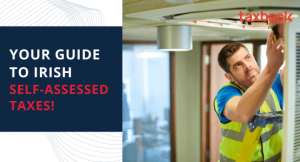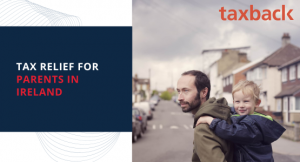Separation, Divorce and Taxes in Ireland
How separation and divorce can affect your tax situation in Ireland
When a married couple decides to separate or get divorced, there are implications for the way in which they are taxed.
It is important to understand the various taxation options available and how certain decisions made during this time – for example, in relation to maintenance payments – can affect taxation.
With this in mind, in this guide, we will outline the effects that separation and divorce can have on both partner’s tax situations.
Do I need to tell Revenue if I have separated from my spouse or civil partner?
Yes, you need to inform Revenue as soon as possible, so the right adjustment to your tax position can be made.
Do my tax credits change if I am separated?
For the year after the year of separation, each spouse is treated as a separated spouse and is taxed as a single person, unless election for joint assessment is made (see below).
What happens in the year when a married couple separates
In the year of separation, both partners will be taxed as follows:
Jointly assessed prior to separation:
The person who is chargeable to tax on the couple’s joint income (the assessable spouse) will be:
- entitled to the married tax credits and married rate band for the full tax year;
- taxed on their own income for the full year and their ex-partner’s income from the start of the tax year until the date of separation.
The non-assessable spouse will be:
- taxed on their own income from the date of separation to the end of the tax year;
- entitled to single person’s tax credits and single rate bands.
Separately assessed prior to separation:
The situation is the same as that outlined for joint assessment:
• The partner who was the assessable spouse prior to the claim for separate assessment is the assessable spouse for the year of separation until the date of separation;
• Any unused tax credits and relevant standard rate band for the period prior to separation may be transferred from one spouse to the other.
Single assessment prior to separation:
In this case, there will be no changes in taxation. Both spouses will continue to be taxed as single persons and entitled to single person tax credits and single rate bands.

What happens with taxes in the years following the separation/divorce?
The answer to this question depends on whether there are maintenance payments for the benefit of the other spouse and whether such payments are voluntary payments or are made under a legally enforceable arrangement.
Voluntary Maintenance Payments
Voluntary maintenance payments (i.e. payments which are not legally enforceable) are not taken into account when calculating either spouse’s tax liability, i.e.
• Тhe spouse who makes the payments is not entitled to a tax deduction for them
• Тhe spouse who receives the payments is not taxed on them
Example:
Emma and John are separated and living apart. John has an annual salary of € 35,000 and Emma’s income is €8.000. John is making a voluntary annual maintenance payment of €10,000.
• John is making the voluntary maintenance is not entitled to a tax deduction for the payments of €10,000
• Emma does not have to pay tax on the €10,000 she receives as maintenance payments
Legally Enforced Maintenance Payments
These are legally enforceable payments made under a court order.
Such payments can be monetary payments as well as mortgage payments, health insurance premiums, etc.
If this payment is for the benefit of a child, it is ignored for tax purposes. If it is for the benefit of the spouse, then it is taxable for the receiving spouse. The one who pays can claim a deduction against his income for both PAYE and USC purposes.
What happens if there are no maintenance payments involved?
Where a couple is separated or divorced or obtains a civil annulment, and no maintenance payments are made, each spouse will be taxed as a single person.
Can you be taxed together after a separation/divorce?
A separated/divorced couple may choose to be taxed as a married couple if there are legally enforceable maintenance payments for the benefit of the other spouse. In this situation, the payments are not subject to taxation.
The spouse who is receiving the payment is not taxed on it and the one who is making the payment is not entitled to a deduction.
If they wish to be taxed this way, they both must confirm this before the end of the tax year. They must have not remarried if they have once divorced.
In such circumstances, the person who wholly or mainly maintains their ex-spouse to claim the married personal tax credit but not any additional rate band.
Single Parent Child Carer Credit
The Single Person Child Carer Credit (SPCCC) is a tax credit for people who are caring for children on their own. The credit is worth €1,650 in 2020.
If you have separated or divorced and have a child that you care for, you may be eligible to claim this credit.
This partner is known as the primary claimant. You can choose to relinquish this credit in favour of the second partner if you wish.
A qualifying child is:
• Born in the same tax year, orExample
• Under 18 years old at the beginning of the tax year, or
• Over 18 at the beginning of the tax year, but receiving instruction at an educational establishment, university, etc.
The Single Parent Child Carer Credit can be claimed in the year after the year of separation/divorce. No credit will be allowed in the year of separation/divorce.
It should be noted that the primary claimant is the spouse who spent more than half a year with the child. In a case where the primary claimant wants to relinquish the credit in favour of a secondary claimant, the secondary claimant must spend at least 100 days a year with the child.
The average Irish tax refund is €1,880
Got questions about tax?
We know most people are unsure of their tax entitlements and daunted by the prospect of dealing with tax paperwork.
But don’t worry. We’re here to help you claim your tax back in Ireland!
Our tax team are on hand 24/7 to answer your tax questions and ensure you are availing of every credit and relief you’re entitled to.
Our average PAYE tax refund is €1,880.
To find out how much you’re due, simply complete the short form here.




